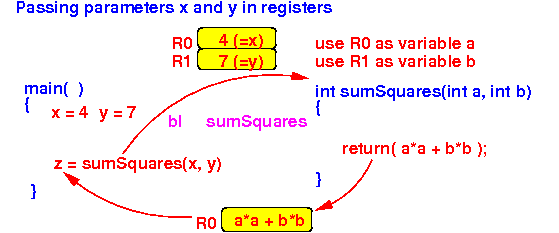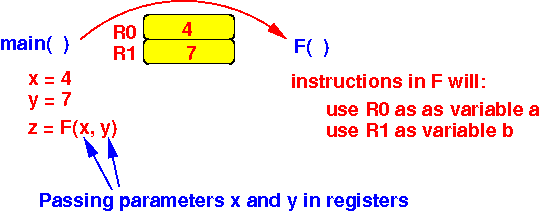- Consider the following
example program:
void main( ) // I omitted the 'public static' for simplicity { int x = 4, y = 7, z; z = F(x, y); // Pass parameters x, y and receive return value } int F(int a, int b) // I omitted the 'public static' for simplicity { int s, t; // Local variables .... return(77); }The subroutine call statement:
z = F(x, y); // Subroutine call statementpacks a lot of meaning in a high level programming language
We are here to spell out what exactly happens in a subroutine invocation (call) statement.
- You were told in
CS170 that:
- The subroutine invocation
F(x, y) will
- passes the variables x and y (to the function F( ))
- Then the statements (= instructions) in
the subroutine F( )
are executed
using
a = x (= 4 in example) and
b = y (= 7 in example)

- The subroutine invocation
F(x, y) will
- The one thing that
- Passing parameters to a function
- Passing the return value to a caller function
- Creating local variables for a function
is:
- They all
require the
use of
memory cells:
- You need memory cells to store the parameter (variables)
- You need memory cells to store the return value
- You need memory cells to store the local variables
- Memory elements
(= devices that
can be used
to store values) can be found in:
- The computer memory (of course... it has the word memory in it !!!)
- The registers in the CPU !!!
So passing parameters, passing return values and allocating memory for local variables can be done using:
- Registers in the ALU
- Computer memory - specifically: memory space on the system stack !!!
- Consider the following
example program:
void main( ) // I omitted the 'public static' for simplicity { int x = 4, y = 7, z; z = F(x, y); // Pass parameters x, y and receive return value } int F(int a, int b) // I omitted the 'public static' for simplicity { int s, t; // Local variables .... return s; }The subroutine call statement:
z = F(x, y); // Subroutine call statementpacks a lot of meaning in a high level programming language
We are here to spell out what exactly happens in a subroutine invocation (call) statement.
- You were told in
CS170 that:
- The subroutine invocation
F(x, y) will
- passes the variables x and y (to the function F( ))
- Then the statements (= instructions) in
the subroutine F( )
are executed

- The subroutine invocation
F(x, y) will
- When main( )
calls F(x, y):
z = F( x, y );main( ) passes its variable x and y to F( )
We can pass these parameters by copying the values in these variables in some registers
For example:
- Copy the variable x in register R0
- Copy the variable y in register R1
- In this case:
- The function F( ) must use register R0 as its parameter variable a !!!
- The function F( ) must use register R1 as its parameter variable b !!!
Schematically explained:

- You can use registers to pass parameters to a function
- You can use registers to return a value to the caller
- You can use
registers as
local variables
However:
- Using
registers to
pass parameters and
storing local variable
can
only be done
in a
leaf subroutine because
- When a non-leaf subroutine calls another subroutine, the values in the registers will be lost !!!
In other words:
- Never use registers to pass parameters nor as local variable in a non-leaf subroutine !!!
- Using
registers to
pass parameters and
storing local variable
can
only be done
in a
leaf subroutine because
|
|
- Consider the 2nd example
program to illustrate
passing paremeters,
passing return values and
creating local variables:
void main( ) // I omitted the 'public static' for simplicity { int x, y, z; z = squaresum(x, y); // Pass parameters x, y and receive return value } /* -------------------------------------- Returns: a^2 + (a+1)^2 + ... + b^2 -------------------------------------- */ int squaresum(int a, int b) // I omitted the 'public static' for simplicity { int i, s; // Local variables s = 0; for ( i = a; i <= b; i++ ) s = s + square(i); return s; } int square(int x) { return(x*x); }